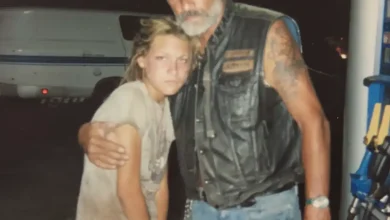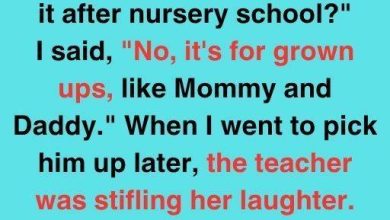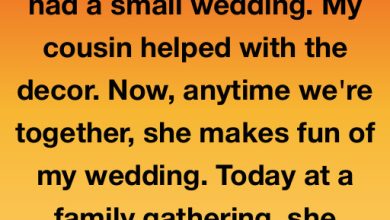The Washing Machine Repair Guy Gave Me A Note—But It Wasn’t About Me At All

It all started with a simple, everyday problem: the washing machine was leaking. I quickly called a professional repairman to take a look. He arrived, worked his magic, and fixed the leak in less than an hour. I paid him for the service, and he was on his way out the door. That’s when things took an unexpected turn.
As the young man was leaving, I noticed his cheeks turned pink, and he nervously reached out to hand me a small piece of paper. I took the note, unfolded it, and read the strange message: “Please call me. It’s about someone you know.”
My first instinct was to think: weird. I almost threw the paper straight into the trash. But I paused because of how he looked when he gave it to me—his eyes were facing the floor, and his hand was shaking slightly. His name was Ruben, and he seemed to be around 25 years old. He was quiet and polite. He certainly didn’t seem like the type of person who would hand out odd messages to a middle-aged woman whose hair was starting to turn gray and who had a laundry basket full of unmatched socks.
The Call That Changed Everything
The next day, my curiosity got the best of me, and I decided to call the number. He answered on the second ring.
“Hi, this is… uh, the washing machine lady,” I said, feeling a little awkward.
He cleared his throat. “Thank you for calling. I didn’t know how else to… I mean, this is awkward, but… do you know someone named Felix Deren?”
Hearing that name was a huge shock, like a sudden slap in the face. I had to sit down hard on the couch.
Felix Deren was my ex-husband.
We had not spoken to each other in more than seven years. Not since our divorce ended on a very difficult note. He had moved far away, and no one knew exactly where he had gone. Since we never had children or shared property, the silence between us simply grew over time. My friends always told me I was lucky to be rid of him, but I remembered a time when I truly believed he was the most wonderful person in the world.
“Yes, I know him,” I replied slowly. “Why?”
Ruben hesitated for a moment, and then said, “He’s my father.”
I simply blinked, completely stunned.
“I don’t mean to scare you or anything,” he quickly added. “I just found out a few months ago. My mom told me after he died.”
That one word—died—felt incredibly heavy, like a brick falling into my lap. I had so many questions running through my mind that I didn’t even know which one to ask first.
“He… he passed away?” I finally asked.
“Yeah. In February.”
It was already June.
A Story Unfolds: Painting and Forgiveness
It turned out that Felix had moved down to San Luis Obispo, where he started painting and lived a calm, quiet life. Ruben’s mother—Elira—had a short relationship with him in the early 2000s. She never told Felix she was pregnant and raised Ruben on her own.
“He tried to reach out to her a few times, but I guess she was scared. Or stubborn. She only told me the truth after the funeral. Said he left a box for me. In it… was a letter. And pictures. And your name.”
I was completely amazed. I could not think of anything to say.
“Can we meet?” he asked gently. “There’s something he wanted me to give you.”
We met at a small, quiet coffee shop the very next afternoon. Ruben arrived wearing jeans and a work shirt, with a little grease still visible under his fingernails. He looked so much like Felix that it brought a strange ache to my heart—he had the same thick eyebrows and the same quiet, calm stare.
He handed me an old, well-used envelope that was yellowed at the corners. My name was written on it in Felix’s familiar, elegant handwriting.
My hands were shaking as I opened it.
The letter was four pages long.
The first page was an apology. He apologized for how our time together had ended, for the emotional distance he created, and for not fighting harder to keep me. He wrote that he felt “broken back then”—afraid of failing, and afraid of not being good enough.
The second page was filled with memories. These were small, personal details that only someone who truly loved you would remember. He mentioned the way I used to hum quietly when I was folding laundry. He recalled the time I cried during a commercial for pet food and immediately tried to pretend I just had allergies.
The third page was all about Ruben. Felix wrote that he had only found out the truth about having a son one year before he died. He had tried to call him, but Elira would not return his messages. He mentioned that he left things behind for Ruben—a small savings account, a list of books he hoped his son would read, and letters.
The last page was for me again. He asked for my forgiveness, although he admitted he didn’t expect it. He said that if Ruben ever found me, he hoped I would give him a chance. “He’s a good kid,” Felix wrote. “Better than I ever was. I hope you see a part of me in him—but mostly, I hope you see him for who he is.”
When I finally looked up, my eyes were filled with tears. Ruben didn’t speak. He simply sat there quietly, giving me the time and space I needed.
Building a New Connection, Piece by Piece
Over the next few weeks, Ruben and I stayed in contact. He came over once to fix my dryer when it started making a terrible, loud squeal. Then he returned again when I couldn’t figure out how to get the backyard sprinklers working. I started baking again—something I hadn’t done in years—and always made extra treats for him.
One evening, after he finished helping me re-seal the edges of my bathtub, we sat on the porch, slowly drinking lemonade. The air smelled fresh, like newly cut grass and sweet honeysuckle. Without warning, he said, “You know, I used to wonder what it’d be like to have a family.”
I didn’t answer right away. I wasn’t sure if I was the right person to respond.
Then I said, “So did I.”
From that moment on, he started calling me every Sunday. They were just short calls—updates on his work, asking if I had watched a certain new documentary, or if I could suggest a good dinner recipe that didn’t involve pasta.
About three months later, he brought Elira, his mother, to my house so we could finally meet.
I wasn’t sure what to expect. Maybe some cool distance or awkward small talk. But she walked in holding a lemon tart and said, “I heard you bake too. Maybe you can show me how not to burn the crust.”
She was funny, direct, and much kinder than I had imagined. She also carried a lot of sadness about keeping Felix away, but I did not judge her for it. Life is often complicated. People simply try to protect themselves the best way they know how.
That night, we laughed together over wine and old memories. She asked me if Felix ever painted when we were married. I told her no. He didn’t even draw doodles.
“Well, he got good,” she said. “Real good.”
Ruben went out to his truck and brought in two canvases wrapped in paper.
I recognized my own face immediately in one of the paintings—older, but clearly me. The light was soft, and I had a faint smile, like I was about to say something and then forgot what it was. I had never posed for that portrait, but somehow, Felix had painted me exactly as I was.
“He painted you from memory,” Ruben said. “There’s a whole stack of them.”
My heart felt like it was breaking open. I had spent years believing he had completely forgotten me.
I hung the portrait in my living room. I didn’t do it out of vanity, but because it was a reminder of the person I used to be—and the person I still had the chance to become.
A few weeks later, Ruben asked if I would go with him to an art auction in San Luis Obispo. Some of Felix’s paintings were going to be shown. We drove down together in my slightly dented Civic car, with the windows rolled down and music playing loudly.
The gallery was small but nice. Felix’s artwork was displayed under soft lights, and people were quietly saying nice things about the pieces. There were paintings of nature, still objects, and a few peaceful portraits of strangers.
Then I saw one painting titled “The Last Thing I Remember.” It was a picture of the kitchen in our old house—sunlight pouring over a cup of tea, a plate with half-eaten toast, and a red cardigan sweater draped over a chair.
It was my red cardigan.
I stood there, unable to move. That morning—years ago—was the day we had our worst fight. I had thrown that sweater down and walked out the door. I never returned.
“He kept painting you,” Ruben whispered next to me. “Even when he was sick.”
It turned out that Felix had been fighting cancer for almost three years. He did it quietly. He didn’t tell anyone outside of a very small group. Not even his own sister. He just kept painting, as if he were trying to say all the things he never could with words.
I drove home that night feeling like I had been given a second chance that I hadn’t asked for—but one that I very much needed.
Home Is Who Stays
Over time, Ruben became a regular and important part of my life. He helped repaint my kitchen, showed me how to change the oil in my car, and even taught me how to cook a steak correctly on the grill (apparently, I had been doing it wrong for 20 years).
But it wasn’t just about fixing broken things.
He listened. He asked thoughtful questions. He remembered my birthday and brought me small gifts—a sunflower on a Tuesday, a box of sweet baklava after a bad week, a well-read copy of a novel I had mentioned off-hand.
One evening, as we were putting away a few of Felix’s old belongings that Ruben had inherited, we found a letter tucked inside a book of poetry. It was addressed simply: “To the person who stayed.”
I read it out loud.
It was written for whoever stood by Ruben when he finally allowed himself to be loved. It talked about how people are not puzzles you must solve, but more like gardens you simply have to take care of. And how the most lasting, important things in life often arrive quietly, after all the loud noise has faded away.
That letter touched a very deep emotional chord in both of us.
We sat in silence for a while, letting the power of those words sink in. Then Ruben turned to me and said, “I know I’m not your son. But I’d like to stick around—if that’s okay.”
I laughed through my tears. “You already have.”
We don’t try to label what we have, exactly. But he brings me groceries when I’m feeling unwell, and I iron his work shirts when he’s too tired. We disagree playfully about movie endings and argue over crossword puzzles, and we make each other tea without even having to ask.
Last Christmas, he showed up with a framed picture. Inside was a painting of my house—lights on, curtains closed, with snow gently falling outside. A small figure was standing at the doorway, holding a wrench and a pie.
Underneath, it read: “Home Is Who Stays.”
I suppose life has a surprising way of giving you back something you thought you had lost—it just might not arrive in the exact form you expected.
Sometimes, the people we are meant to love forever don’t come into our lives at the very beginning. Sometimes, they arrive only after the repairs.
So yes, the washing machine leaked. But that broken appliance brought me a family I didn’t know I was still allowed to have.
If this true story warmed your heart, please consider giving it a like or sharing it with others. You never know who might be needing to hear about a second chance today.




